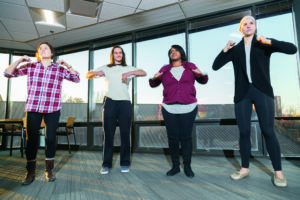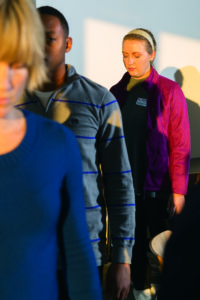According to an old Zen proverb, you should meditate for 10 minutes a day. Unless, of course, you’re too busy. Then you should meditate for an hour.
The lesson of the adage is that it’s the busiest people who could benefit most from meditation, but the reality is that almost everyone struggles to find calmness in today’s hectic, always-connected world. College campuses are no exception. In fact, the very nature of academic life poses additional mental demands on students, faculty and staff alike.
That’s why UofL is engaging in mindfulness initiatives across its campuses, from clinical research studies and mindfulness workshops to meditation rooms and smartphone apps, all designed to foster a greater sense of wellbeing and to lower stress among the university community.
And while the word “meditation” can conjure images of monks in robes and far-off monasteries, it’s really just one form of a broader concept called “mindfulness,” which is commonly defined as being non-judgmentally present — no matter what you’re doing.
“It’s about paying attention,” says Paul Salmon, associate professor of Clinical Psychology. “That’s it. It’s really very simple. So whether you’re eating or having a conversation or driving your car, when your mind starts to wander off, you notice what’s happening and you bring your mind back to the present moment.”
To some, this deceptively simple practice may sound like nothing more than new-age fluff, but the catalyst for its recent popularity was, in fact, the rigorous scientific research of Jon Kabat-Zinn, who developed a Mindfulness-Based Stress Reduction (MBSR) course at the University of Massachusetts Medical School in 1979. The eight-week program taught patients how to use mindfulness practices to reduce stress, pain and anxiety — with measurable results.
Salmon became interested in this scientific approach to mindfulness and in 1995 took sabbatical leave to learn from and collaborate with Kabat-Zinn in his stress reduction clinic.
“That was a transformative experience,” Salmon said. “Everything I’ve been doing since then, one way or the other revolves around mindfulness.”
That includes a wealth of research done through UofL’s Mindfulness and Biobehavioral Health Research Laboratory, which Salmon founded and co-directs with his colleague Sandie Sephton, associate professor of Psychological and Brain Sciences. Together, they direct studies on clinical applications of mindfulness — such as in patients with breast cancer — as well as biological mediators of its health effects — such as cortisol levels (a key indicator of stress) in college undergraduates.
Salmon also offers a weekly drop-in meditation at the Humana Gym, teaches the eight-week MBSR course for faculty and staff each semester and even incorporates mindfulness into many of the classes he teaches. His work extends beyond the university as well. Salmon has taught mindfulness at non-profit organizations like Wayside Mission and Gilda’s Club, and he hopes to do more work with groups like the Urban League of Louisville to bring mindfulness to the city’s underserved communities.
“We’re so demanding and hold ourselves to such high standards, and when something seems wrong, we want to fix it right away,” Salmon said. But with mindfulness, “there’s a much greater sense of tolerance and allowing things to be as they are without feeling like you have to fix them. And that’s important for students, too, who are very sensitive to success and failure.”
Learning how to un-think
Indeed, college students encounter a wealth of stressors, from academic realms to social realms. As the director of Health Promotion & Education, Karen Newton’s job is to help students navigate those challenges while building stress resilience and improving their overall wellbeing. Newton knew that mindfulness practices could help build stress resilience, but when she tried offering traditional courses of eight- or 12-week sessions, students would enroll and quickly drop out. “It wasn’t a model with which they could succeed,” she said. “It was too much.”
In 2015, Newton became aware of an evidence-based curriculum geared specifically to college-age adults called Koru. Developed by researchers at Duke University, Koru mindfulness has proven effective in improving students’ stress levels, sleep quality and self-compassion. Last August, UofL’s School of Medicine sponsored a three-day program in which 15 individuals from UofL and 19 from across the country received training to become Koru instructors. UofL is now one of nearly 70 universities that teach the curriculum, which consists of four weekly sessions of 75 minutes each.
The shorter format and focus on practice instead of lecture makes it easier for busy students to stick with the course. Over the four weeks, participants learn nine different mindfulness techniques, including walking meditation, mindful eating and diaphragmatic belly breathing.
“The very first thing our students experience is better sleep,” Newton said. “They learn in the first class how to voluntarily engage the relaxation part of their brain, and they say, ‘Oh my gosh, I slept through the night! I’ll take more of this!’ They’re no longer totally anxious and sleep-deprived.”
Last year, Health Promotion expanded its mindfulness offerings with two half-day mindfulness retreats and a series called 20 Mindful Minutes. Hosted at different locations across campus, these short sessions are designed both for those who have been through the Koru program and are looking for support in maintaining their mindfulness practice, as well as those who have no prior experience with mindfulness but are interested in learning different techniques to relax and reduce stress.
The sessions were spearheaded by Elizabeth Nalley, a senior majoring in exercise science who credits her current career path to the Koru workshops and other mindfulness resources at UofL.
“If it weren’t for the Koru program and the chance to create 20 Mindful Minutes, I know I would have dropped out of school,” she said. “Instead, I restructured all my courses and research into mindfulness, meditation and the benefits of stress reduction. And now, not only am I graduating, I’m also considering pursuing my master’s in this field of study.”
Meetings of the mindful
Part of a comprehensive employee benefit package, Get Healthy Now (GHN) was launched in 2005 in an effort to mitigate UofL’s top three lifestyle drivers of healthcare cost: obesity, stress and lack of physical activity. Along with traditional fitness equipment and classes, GHN’s wellness center offers health and wellness coaching and stress management programs, including Koru and other mindfulness practices.

“This is not a fluffy, nice thing to do,” stressed Patricia Benson, assistant vice president of Health, Wellness & Disease Management. “There’s hard science that says there’s a direct correlation between mindfulness and enhanced life outcomes and positive impact.”
For more than a decade now, GHN senior wellness specialist Paula Kommor has been helping UofL faculty and staff manage their stress through mindfulness techniques like visualization, belly breathing and progressive relaxation. “Employees come back and say to me, ‘I’m still using that technique you taught me 10 years ago, and it’s really helping me,’” Kommor said. “We connect through that initial class, and then they keep coming back for different offerings.”
More recently, GHN began offering Koru workshops as well as weekly 20-minute mindfulness sessions on each campus that often incorporate yoga, tai chi and similar practices. The center also hosts Salmon’s MBSR program and half-day mindfulness retreats each semester. Kommor has even found success in starting GHN staff meetings with five minutes of mindfulness. “The meetings end in an hour, everyone is calm, we’re productive, we’re more effective,” she said. “It makes a huge difference.”
A healthy dose of compassion
The benefits of mindfulness are perhaps nowhere more needed than in the medical field, where the intensity of the work, changes in the health care system and other challenges are driving historically high levels of burnout nationwide. These systemic problems led Jon Klein, MD, PhD, and Dean Toni Ganzel in UofL’s School of Medicine to support several mindfulness initiatives aimed at preventing physician and student burnout and promoting health, resiliency and compassion.
Ganzel admitted to being a mindful-ness skeptic until she saw the research behind it. “It’s pretty impressive, the effectiveness of mindfulness on an individual’s ability to be more resilient, to bounce back from adversity, to continue to find meaning in their
work,” she said.

Klein agreed that scientific validity is key when discussing mindfulness with the medical community. “It helps to show that the structure and function of the brain changes in people who regularly practice mindfulness,” he said. “You can actually see it on an MRI scan. And that other physiological changes occur as well. Cortisol levels fall, stress hormones fall, some of the inflammatory mediators are decreased. And these are things that people in the medical community can relate to very strongly.”
Klein teaches an eight-week mindfulness elective for second-year medical students, and this spring the school hopes to offer a Mind-Body Medicine course based on training that Klein and Ganzel recently received at Georgetown University. The school also hosts weekly yoga and tai chi classes, offers two quiet spaces for meditation and has purchased 500 licenses to a mindfulness app called WHIL. Klein and Ganzel’s aim is to have a range of offerings for faculty, staff and students to choose from, knowing that different practices will resonate with different people.
Already, the response from students has been tremendous. “Medicine is an inherently stressful career,” said third-year medical student Matthew Neal, who participated in Newton’s Koru workshops, as well as the instructor training last year. “It exposes practitioners to a very raw edge of the human condition on a daily basis, and that can be terribly draining. Mindfulness provides access to a much needed sense of perspective for physicians. It allows them to be there for their patients more fully, to provide better care.”
Together with classmates Melinda Ruberg, Anish Deshmukh and Katherine Yared, Neal received third place in the American Medical Association’s inaugural Medical Education Innovation Challenge for developing a model for medical schools to support a more compassionate approach to medical education, including the creation of wellness-oriented spaces and other mindfulness initiatives already in place at UofL.
Which is fitting, considering that mindfulness teaches us that where we are right now is exactly where we need to be. And when that place happens to be a university dedicated to nurturing both academic talent and personal well-being, that’s certainly something to celebrate.


























